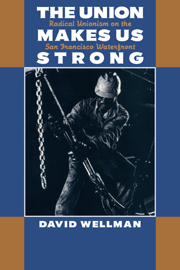Book contents
- Frontmatter
- Contents
- Preface
- Notes on unpublished sources
- PART I LABOR RADICALISM REVISITED
- PART II LOCAL COMMUNITY AND “TUMULTUOUS” DEMOCRACY: THE SOCIOCULTURAL FOUNDATIONS OF UNIONISM ON THE SAN FRANCISCO WATERFRONT
- PART III UNIONISM, WORK, AND TECHNOLOGICAL CHANGE
- PART IV WAGING THE BATTLE FOR WORKPLACE CONTROL ON CONTRACTUAL TERRAIN
- PART V AGREEING TO DISAGREE: BEING DEFENSIBLY DISOBEDIENT
- 13 Translating troubles into grievable issues
- 14 “We essentially have no contract with you”: Keeping the agreement
- 15 Constructing and maintaining the appearance of cooperation
- Conclusion: Trade union exceptionalism or prefigurative politics?
- Appendix: Doing field research: An ethnographic account
- References
- Name index
- Subject index
14 - “We essentially have no contract with you”: Keeping the agreement
Published online by Cambridge University Press: 11 November 2009
- Frontmatter
- Contents
- Preface
- Notes on unpublished sources
- PART I LABOR RADICALISM REVISITED
- PART II LOCAL COMMUNITY AND “TUMULTUOUS” DEMOCRACY: THE SOCIOCULTURAL FOUNDATIONS OF UNIONISM ON THE SAN FRANCISCO WATERFRONT
- PART III UNIONISM, WORK, AND TECHNOLOGICAL CHANGE
- PART IV WAGING THE BATTLE FOR WORKPLACE CONTROL ON CONTRACTUAL TERRAIN
- PART V AGREEING TO DISAGREE: BEING DEFENSIBLY DISOBEDIENT
- 13 Translating troubles into grievable issues
- 14 “We essentially have no contract with you”: Keeping the agreement
- 15 Constructing and maintaining the appearance of cooperation
- Conclusion: Trade union exceptionalism or prefigurative politics?
- Appendix: Doing field research: An ethnographic account
- References
- Name index
- Subject index
Summary
“LET'S get this fucking agony over with quickly,” announced a business agent to a Special Labor Relations Committee. The two sides were discussing union complaints about a stevedoring company that had hired non-ILWU workers. “They have 9.43 men painting strads,” he said, “IAM [International Association of Machinists] people are doing maintenance and repair work; IAM people are hooking and unhooking equipment; sailors are doing lashing and 9.43 crane operators are being contracted out to other companies.”
The grievances extended beyond these particulars: “This company burns up too much union time,” he continued, “they pay management to find ways for getting around the contract.” The relationship between union and management was also an issue: “We essentially have no contract with you,” he concluded, looking at the people across the table.
If the charges were true, his assessment was accurate. The union's agreement to cooperate would exist only on paper. There would be no agreement in fact if the company circumvented agreed-upon procedures to resolve disagreements. If each side acts unilaterally, the rules for joint action are difficult to apply; cooperation is problematic. When the contract is not treated as a “living” document, the agreement does not work. The business agent was therefore correct; effectively, there was no “contract.” But this presents a problem: If either side is to be defensibly disobedient, the contract must be allowed to “live.”
- Type
- Chapter
- Information
- The Union Makes Us StrongRadical Unionism on the San Francisco Waterfront, pp. 268 - 281Publisher: Cambridge University PressPrint publication year: 1995



